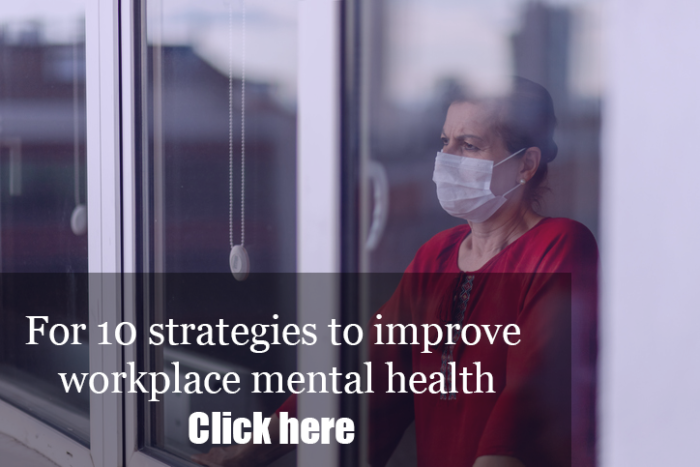Employees are experiencing higher levels of risk for depressive and anxiety disorders since the start of the pandemic.
54: Percentage increase in number of employees at risk for depressive disorder
New data finds that when comparing numbers from Feb. 3, before the widespread outbreak of COVID-19, and June 28, there is an increased risk among employees of 54% for depressive disorder, 49% for PTSD, 41% for general anxiety disorder and 11% for addiction.
Results were gleaned from a June index from Total Brain, a mental health and brain performance self-monitoring and self-care platform. The index, also in partnership with the National Alliance of Healthcare Purchaser Coalitions and One Mind at Work, is based on 500 anonymized assessments randomly selected among thousands of Total Brain assessments taken each week.
[the_ad id=”1630″]
What it means to HR leaders
The index continues to prove that mental health impacts of coronavirus are not dying down months into the pandemic. That’s despite the fact that some HR and benefits leaders plan to expand, roll out or communicate existing mental health benefits, apps and other resources in an effort to help employees.
June’s index found that the number of employed adults at risk for mental health conditions remained “alarmingly elevated” when compared to February data. Nearly half of employees say they’re suffering from PTSD, 41% from general anxiety disorder and 11% from addiction.
“The numbers do not lie,” says Total Brain CEO Louis Gagnon. “There is a mental health crisis in our country, and the data supports our case for increased attention on employee mental health among HR leaders.”
Several studies have spotlighted the toll the pandemic is taking on employees’ mental health.
“The need to address workplace mental health has never been more important as the levels of anxiety, depression, PTSD and other mental health conditions are dramatically impacted by the continuing stress, uncertainty and economic impacts of the COVID-19 pandemic,” says Garen Staglin, chairman of One Mind at Work.
[the_ad id=”1897″]
[the_ad id=”1884″]
[the_ad id=”1745″]
[the_ad id=”1902″]
New data finds that when comparing numbers from Feb. 3, before the widespread outbreak of COVID-19, and June 28, there is an increased risk among employees of 54% for depressive disorder, 49% for PTSD, 41% for general anxiety disorder and 11% for addiction.
Results were gleaned from a June index from Total Brain, a mental health and brain performance self-monitoring and self-care platform. The index, also in partnership with the National Alliance of Healthcare Purchaser Coalitions and One Mind at Work, is based on 500 anonymized assessments randomly selected among thousands of Total Brain assessments taken each week.
[the_ad id=”1630″]
What it means to HR leaders
The index continues to prove that mental health impacts of coronavirus are not dying down months into the pandemic. That’s despite the fact that some HR and benefits leaders plan to expand, roll out or communicate existing mental health benefits, apps and other resources in an effort to help employees.
June’s index found that the number of employed adults at risk for mental health conditions remained “alarmingly elevated” when compared to February data. Nearly half of employees say they’re suffering from PTSD, 41% from general anxiety disorder and 11% from addiction.
“The numbers do not lie,” says Total Brain CEO Louis Gagnon. “There is a mental health crisis in our country, and the data supports our case for increased attention on employee mental health among HR leaders.”
Several studies have spotlighted the toll the pandemic is taking on employees’ mental health.
“The need to address workplace mental health has never been more important as the levels of anxiety, depression, PTSD and other mental health conditions are dramatically impacted by the continuing stress, uncertainty and economic impacts of the COVID-19 pandemic,” says Garen Staglin, chairman of One Mind at Work.
[the_ad id=”1897″]
[the_ad id=”1884″]
[the_ad id=”1745″]
[the_ad id=”1902″]

